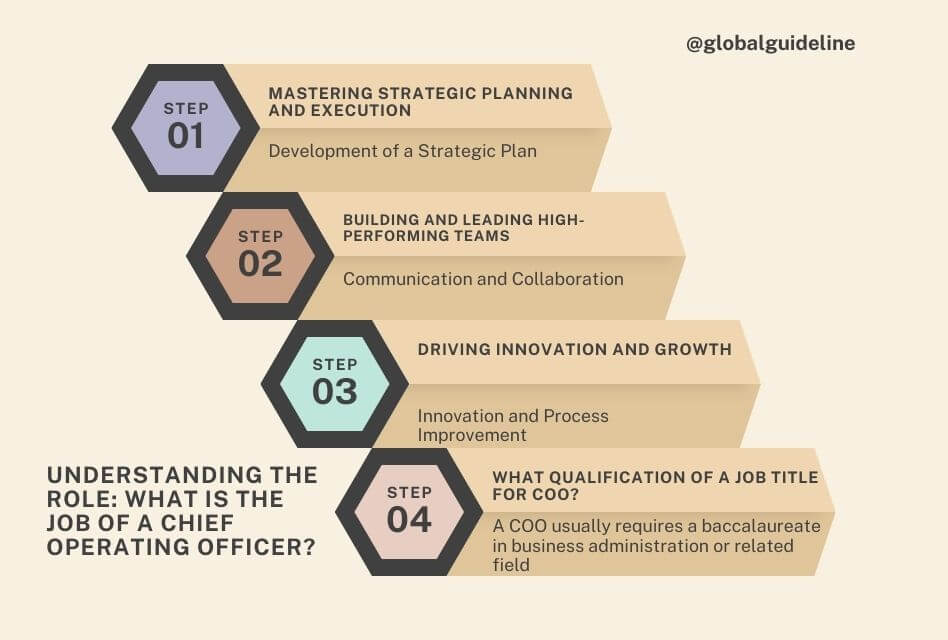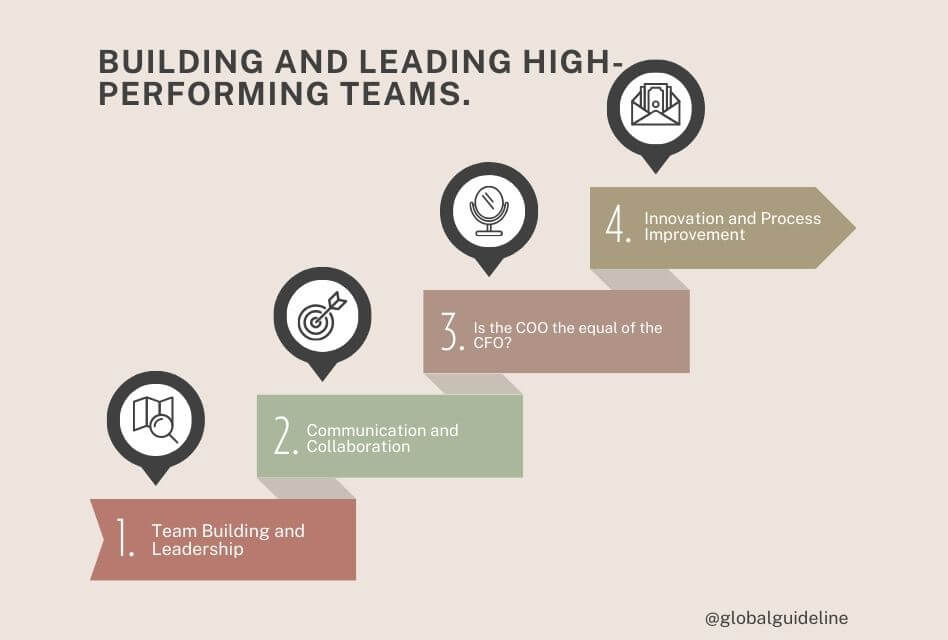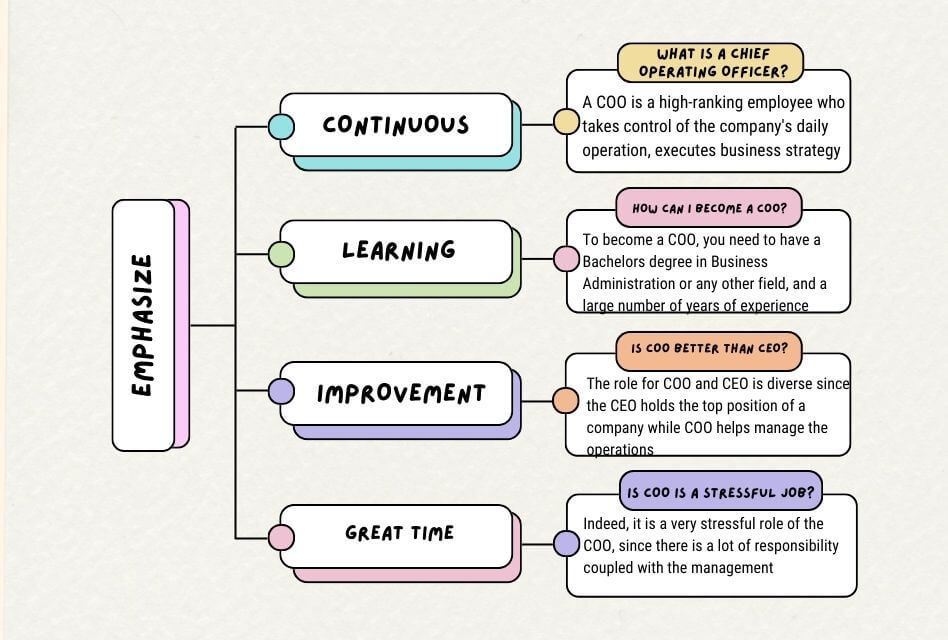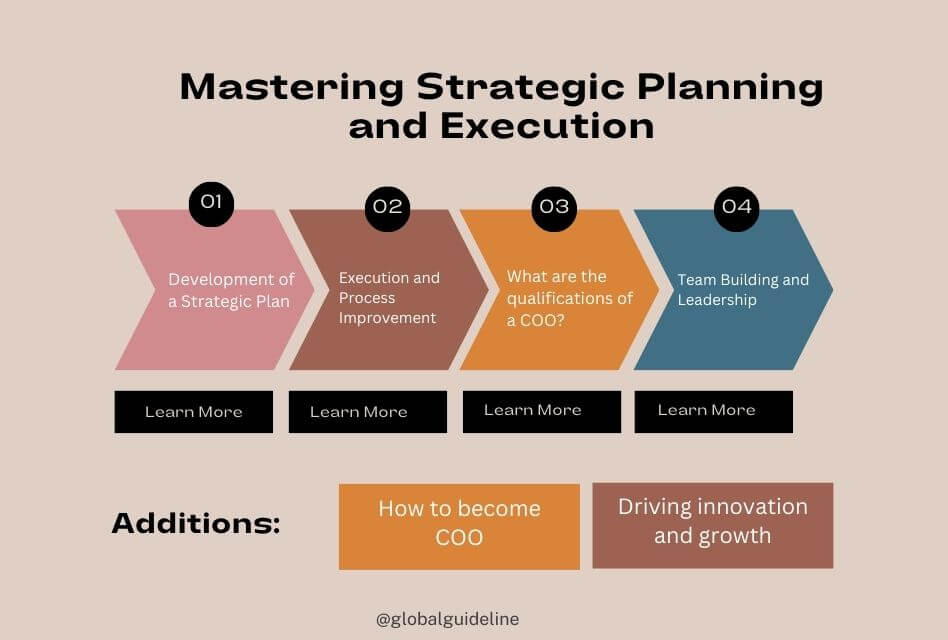A Chief Operating Officer, perhaps, occupies the most pivotal position in any organization. The organization’s operational tasks come under the purview of the Chief Operating Officer; it guarantees how the company’s strategic objectives are met smoothly and effectively. Whenever business operations undergo changes, the requirement for outstanding COOs also increases and continues across various sectors such as health care, technology, or finance. In this article, we are going to talk about the top three reasons for success in chief operating officer jobs, insights that should reach those who are looking to enter into this challenging and rewarding role.
Table of Contents

Understanding the Role: What is the Job of a Chief Operating Officer?
Before delving into the factors of success, it is very important to know what a chief operating officer does. The COO is usually the one who reports directly to the CEO, second in line. Their duties include overseeing the operations of the company, implementing business strategies, and ensuring that the company fulfills its operational goals.
Describe the job description of a chief operating officer. Frequently, the job description involves managing daily business activities, developing and implementing operational strategy for the company, as well as working collaboratively with other members of senior leadership in achieving common business objectives. Process improvement is an indispensable role of a COO, and he ensures all departments align with the company’s overall strategy.
It’s stressful. Managing such an accountable position with so many varied aspects of the business requiring simultaneous management can be stressful. However, it can also be the most rewarding job for those who thrive under pressure and solve complicated problems.
1. Mastering Strategic Planning and Execution
Of all factors determining a chief operating officer’s success, the most significant is the individual’s ability to develop and implement a strategic plan that has an easy linkage to the vision for the company. The COO needs to establish whether the company is performing its operations right while still scanning the horizon for what is ahead-challenges and opportunities.
Development of a Strategic Plan
A good COO must be well informed about the company vision and goals. The COO, working closely with the CEO and the board of directors, develops a strategic plan outlining what the company aims to achieve and the steps necessary to achieve it. The whole scope of the operation of the company, including production and customer service, should be comprehensively covered.
A COO in Pakistan is, in fact, a version of what it is in other countries. Accordingly, as in the case of other countries, the primary functions of a COO in Pakistan are managing day-to-day company operations and ensuring that the firm’s strategic objectives are accomplished.
Execution and Process Improvement
The COO is tasked with the execution of a strategic plan. This calls for a lot of leadership skills on his part, as he will have to manage many teams and departments. The need for process improvement is important because he must always look for ways to raise the efficiency in whatever undertaking, reduce cost, and generally improve the product quality or services.
What are the qualifications of a COO? Generally, a COO will have a bachelor’s degree in business administration or a related field with several years of experience in senior leadership roles. Advance degrees, like an MBA, are often preferred.
2. Building and leading high-performing teams.
Building and leading high-performance teams is the other crucial success factor in COO jobs. The COO has to ensure that all departments of an organization work well to actualize the goals of the company.
Team Building and Leadership
A successful COO knows that success of a company and its team strength to work together is required. This means finding great talent, creating an environment where people enjoy going to work, and providing all the support required for the teams to perform at their best.
How to become COO: To become a COO, one requires a combination of formal education, experience, and leadership capabilities. Aspiring COOs will focus on gaining experiences in various operational roles, building strong leadership capabilities, and developing a deep understanding of the industry in which they work.
Communication and Collaboration
A COO would require effective communications to pass on the vision and strategy of a company at all levels so that the organization works together towards common goals. Collaboration is also important in this respect, as the COO needs to collaborate with other senior leaders within a company, including the CEO, CFO, and department heads, to ensure that operations will be well-aligned with strategic objectives.
Is the COO the equal of the CFO? The COO and CFO would be reporting to senior leadership, but there is a difference between them as far as their functions go. The CFO would be concerned with the finance of the company while the COO has a mandate over the operations within the company. Still, the two work hand in glove to sustain the company’s well-being.
3. Driving innovation and growth
Driving organizational innovation and growth is the third requirement for success in the COO jobs. He need to both control and find ways to improve the existing operations of the company besides finding ways to improve and expand the business.
Innovation and Process Improvement
An innovation process assumes an integral place in the strategy of any company that wishes to be competitive in the rapidly shifting business environment. The COO has a great role to play and contributes toward this through driving innovation, such as the new technologies, improvement of existing processes, or new business opportunities.
Yes, but can a COO really become a CEO? Many COOs do advance to the position of CEO. The experience learned in the role of COO, especially in running the operations and realizing growth, gives strong education in being a CEO.
Growth and Expansion
In addition to driving innovation, the COO oversees the growth and expansion efforts of the company. This may include entry into new markets, new products or services, or an increased customer base. For this reason, he needs to understand the market and the company’s capabilities very clearly to successfully execute growth initiatives.
Depending on the industry, location, and size of the company, chief operating officer jobs pays will be different. In the USA, the compensation to COOs can be very high, and the bonus and share options are often included in it.

Chief Operating Officer Interview Questions
Preparing for a chief operating officer job interview, you need to be ready to face strategic as well as some operational questions. Here are the examples:
- Explain the role of the chief operating officer?
Be prepared to discuss how a successful COO manages daily operations, assists in developing and implementing a strategic plan for the organization, and aligns teams to achieve a high performance level. - How do you enhance processes?
The company will want to know your approach to identifying areas for process improvement and how you implement those changes within the organization’s operations. - Can you give me an example of a time when you facilitated growth within an organization?
This is a question that will actually tell you whether or not you have the potential to find areas of growth and implement strategies that expand the market reach for the company. - How do you manage the stress of the COO?
With all of the demands that come with the position, employers will want to know how you manage stress and how high you maintain your performance. - Why are you applying to this COO role?
Employers will seek people actually passionate about the role and who have a clear vision of how they can contribute to the company’s success.
FAQs
1. What is a chief operating officer?
A COO is a high-ranking employee who takes control of the company’s daily operation, executes business strategy and makes sure that the company achieves its operational goals.
2. How can I become a COO?
To become a COO, you need to have a Bachelors degree in Business Administration or any other field, and a large number of years of experience in other senior leadership with robustly leadership and strategic planning qualities.
3. Is COO better than CEO?
The role for COO and CEO is diverse since the CEO holds the top position of a company while COO helps manage the operations that most of the times lead to advancement for the person holding the position to become CEO.
4. Is COO is a stressful job?
Indeed, it is a very stressful role of the COO, since there is a lot of responsibility coupled with the management of various dimensions of business simultaneously.
5. Is there a chance for a COO to be a CEO?
Of course, numerous COOs become CEOs, because the skills and experience acquired in a COO position lay a good basis for further company management.
6. What is the highest-paid COO?
The salary for a COO might be really diversified depending on the respective industry, a location, and the size of the company. However, COOs in the USA could easily obtain lucrative compensation packages, mostly in terms of bonus and stock options.
7. What qualification of a job title for COO?
A COO usually requires a baccalaureate in business administration or related field; many companies prefer applicants holding an MBA or other advanced education equivalent. Extensive experience in senior leadership positions is also necessary.

Conclusion
To be successful in the role of a chief operating officer, some type of potent combination of strategic planning, leadership ability, and operational knowledge must be present. You can become the prime COO by mastering the skill of developing and executing strategic plans, building, and leading high-performance teams, and driving innovation and growth. Whether you aspire to become a COO or are already one and wish to have an edge in that area, those factors will help you end up standing apart from the rest and deliver success in one of the most powerful positions within any organization.
The COO role, though challenging, is a very rewarding one. It provides opportunities for anyone to impact the success of the company and to proceed to even more elevated leadership positions in the future.
Related Posts:
Top 5 Reasons to Always Take a Lead for Success
7 Ways Performing Manufacturing Operations Boosts Supply Chain Success










